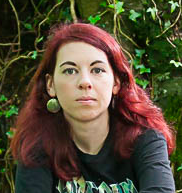Roisin Kelly
 Roisin Kelly is an Irish writer who was born in Belfast and raised in Leitrim. After a year as a handweaver on a remote island in Mayo and a Masters in Writing at National University of Ireland, Galway, she now calls Cork City home. Her chapbook Rapture (Southword Editions in 2016) was reviewed by The Irish Times as ‘fresh, sensuous and direct,’ while Poetry Ireland Review described her as ‘unafraid of sentiment…a master of endings.’ Publications in which her poetry has appeared include POETRY, The Stinging Fly, Lighthouse, and Winter Papers Volume 3 (ed. Kevin Barry and Olivia Goldsmith). In 2017 she won the Fish Poetry Prize. www.roisinkelly.com
Roisin Kelly is an Irish writer who was born in Belfast and raised in Leitrim. After a year as a handweaver on a remote island in Mayo and a Masters in Writing at National University of Ireland, Galway, she now calls Cork City home. Her chapbook Rapture (Southword Editions in 2016) was reviewed by The Irish Times as ‘fresh, sensuous and direct,’ while Poetry Ireland Review described her as ‘unafraid of sentiment…a master of endings.’ Publications in which her poetry has appeared include POETRY, The Stinging Fly, Lighthouse, and Winter Papers Volume 3 (ed. Kevin Barry and Olivia Goldsmith). In 2017 she won the Fish Poetry Prize. www.roisinkelly.com
Mar-a-Lago
The water is rising again
though it hasn’t rained here for months.
The bayou is coming to the door
of her house, her white colonial house
where she rocks on the porch.
She welcomes the bayou.
The bayou remembers
in the way all swamps remember:
preserving past centuries
like a jam of clotted green memories.
The woman’s dress is ruffled lemon cloth,
a pale froth at her black throat.
The sight of her would put
a thirst on you, old man, as you work
on the sugar plantation. But you
will not drink: she has a sweet tooth
having known until now only bitter.
The sun climbs higher
and higher, a golden elevator
to heaven, as she rocks
on the distant porch. In her lap,
a cat sleeping like a gun
on which she rests a ringed hand.
Silver gleam on fur. Later,
when the sun burns down to amber,
she walks to the water’s edge
and climbs onto an alligator.
Gliding down the swamp’s slow river,
she has nowhere in particular to go.
The dark braid hanging on her back
reminds you suddenly
of that sycamore with its noosey rope
through which you once saw the low
sun like a ruby, as if the earth
was begging you to marry it.
If only you had accepted then,
promising to love its children
as your own. Now you are the one
who has been made to kneel
and look, your hands are bleeding.
Ophelia
We came to meet you, Ophelia.
They said we were reckless, driving down from the city
to that little house in the west.
But we were five women who had nothing
if not each other, and have faced far worse things
than your unrest.
On the way we passed sandbags already slung
by the road, long pumps trailing from streams
while the radio said status red,
status red, and on our phones
all of Ireland a rainbow grid. And us burrowing
straight for the dark violet heart
of things, the sky turning green as a bottle.
A strange light over the sea. The air like a balm.
Water folding itself over, settling to glass.
And in the morning we woke to you everywhere.
In the attic, the water tank still gurgled
the house’s quiet song
as if a circle of livid trees did not surround us,
as if that low growl rising from the earth
held no fear for us.
Lighting the fire, lighting a joint.
The slither of flames and gentle scrape
of the grinder, turning like a wheel.
The lights in the house all dimming and
coming back. And coming back, and coming back.
As fishing boats drawn up on shingle
would be returned from land, as blue lamps
would re-illuminate the virgin’s shrine.
We watched leaves swirl
on the patio, until there were no leaves.
We watched the trees bend and almost break
until the windows were crusted with salt.
Make the world new for us again, Ophelia,
who refuse to light cigarettes from a candle
for the sake of a sailor’s soul—
despite what we have borne
at the hands of sailors. Oh tropical storm.
This is no country of palm trees and flower-
filled ditches, but it is the only land we know.
Women who dream of the impossible,
our roots grow deep.